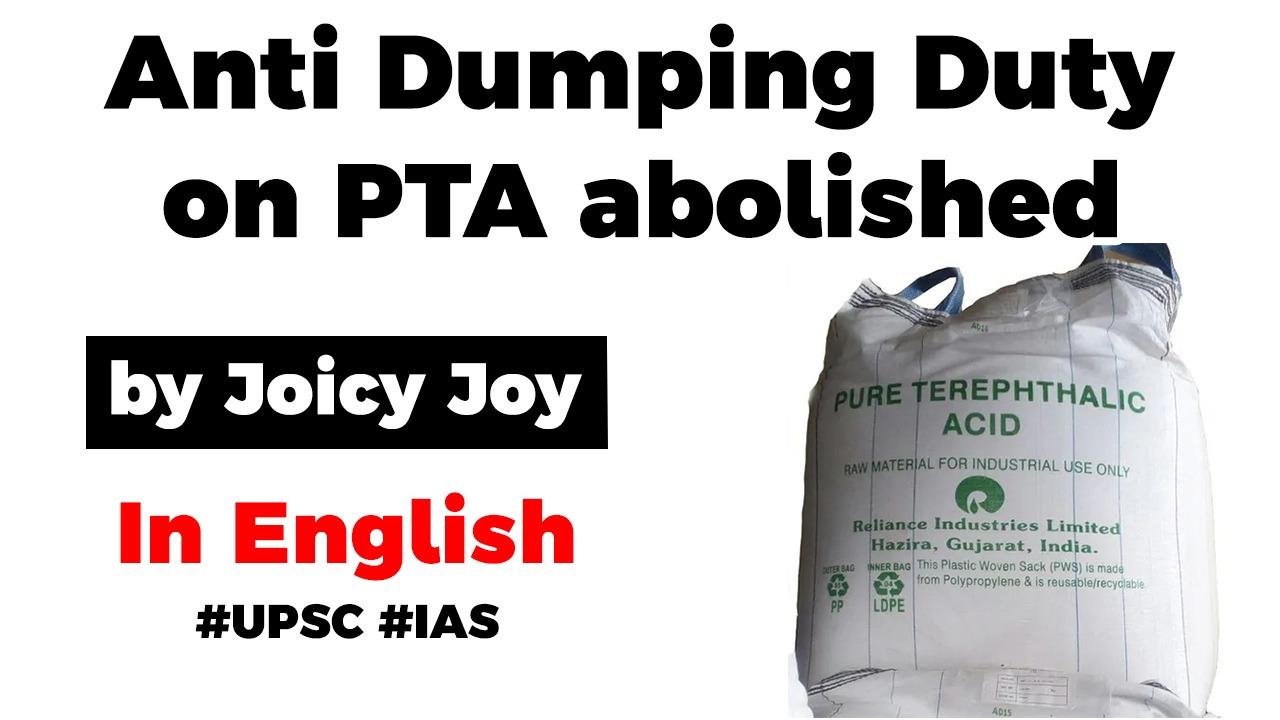Table of Contents
CURRENT AFFAIR
- The government has abolished anti-dumping duty on a chemical called Purified Terephthalic Acid (PTA).
Purified Terephthalic Acid (PTA)
- PTA is an important raw material which is used in making various products, including polyester
- PTA makes up for around 70-80% of a polyester product and is, therefore, important to those involved in the manufacture of man-made fabrics or their components.
- The latest move has come after persistent demand from the manufacturing and textile industry to source PTA at an affordable rate.
Anti Dumping Measures
- Dumping is said to occur when the goods are exported by a country to another country at a price lower than the price it normally charges in its own home market.
- This is an unfair trade practice which can have a distortive effect on international trade.
- Anti-dumping is a measure to rectify the situation arising out of the dumping of goods and its trade distortive effect.
- Many countries impose stiff duties (known as anti-dumping duties) on products they believe are being dumped in their national market, undercutting local businesses and markets.
- The use of anti-dumping measure as an instrument of fair competition is permitted by the World Trade Organisation (WTO)
Background
- The anti-dumping duty on PTA was imposed after domestic manufacturers approached the Directorate General of Trade Remedies (DGTR) in October 2013.
- DGTR imposed anti-dumping duties on PTA imported from South Korea, Thailand, China, Indonesia, Taiwan, Iran and Malaysia between 2014 and 2016.
- However, companies using PTA to manufacture polyester products claimed that the move left them with limited domestic suppliers of PTA.
- The companies alleged that the cost of PTA became more expensive domestically, which made their own products pricier and less attractive for their domestic and international
Directorate General of Trade Remedies
- It is the apex national authority under the Ministry of Commerce and Industry for administering all trade remedial measures including anti-dumping, countervailing duties and safeguard measures.
- It provides trade defence support to the domestic industry and exporters in dealing with increasing instances of trade remedy investigations instituted against them by other countries.
TARIFF
- A tariff or customs duty is a financial charge in the form of a tax, imposed at the border on goods going from one customs territory to another.
- Tariffs applied to imports are usually collected by customs officials of the importing country when goods are cleared through customs for domestic
- Tariffs can also be imposed on exports also but the import tariffs are the most common type of tariffs and have been the main focus of attention of GATT/WTO
Non-tariff measures (NTMs)
- Non-tariff measures (NTMs) are policy measures — other than ordinary customs tariffs — that can potentially have an economic effect on international trade in goods, changing quantities traded, or prices or
Similar Case of Mono Ethylene Glycol
- Mono Ethylene Glycol (MEG) is another such raw material used in the manufacturing of polyester and is under anti- dumping duty investigation initiated by the DGTR, recently.
- The manufacturers of MEG have argued that top MEG exporters like Kuwait, Saudi Arabia, Singapore and the United Arab Emirates (UAE) have been dumping the product because of which the domestic industry is
- Textile companies have approached DGTR against the imposition of anti-dumping duties on MEG as the step would lead to the same situation that developed after imposing anti-dumping duty on PTA.
Latest Burning Issues | Free PDF






















 WhatsApp
WhatsApp